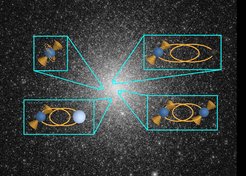
Research group on Compact Pulsar Binaries
Probing fundamental physics with compact pulsar binary searches
“Understanding gravity using a COMprehensive search for fast-spinning Pulsars And CompacT binaries” (COMPACT) is an ERC starting grant project in Astrophysics, hosted at the Max Planck Institute for Radio Astronomy from May 01, 2023. The grant was awarded to Dr. Vivek Venkatraman Krishnan and runs for a duration of 5 years.
COMPACT aims to further our understanding of gravity and nuclear physics through discoveries of highly relativistic binary pulsar systems and ultra-fast spinning pulsars. These discoveries are done via a tailor made, targeted pulsar search survey in dense clusters of stars called Globular Clusters.

Pulsars - rotating neutron stars that emit radio light along their magnetic poles - are some of the densest objects in the Universe. A teaspoon of neutron star matter can weigh as much as Mount Everest. It is impossible to create such high densities on Earth, so astronomical observations provide the only way of understanding ultra-dense matter. When these pulsars are in tight binary systems with another star, they exhibit prominent relativistic orbital effects that can be measured precisely and compared with the predictions from theories of gravity such as Einstein’s General Relativity. Such tests provide the rare possibility to understand if, when and where nature deviates from Einstein’s predictions. COMPACT aims to discover sources that are best suited to help in these endeavors. COMPACT will employ novel signal processing algorithms to find pulsars in very short orbital period binary systems, and pulsars that spin extremely fast (of the order of a millisecond or less). Such COMPACT discoveries are also natural gravitational wave emitters; relativistic binary pulsar systems discovered with COMPACT would be observable with future space-based gravitational-wave detectors, such as LISA. Depending on potential asymmetries in the shape of neutron stars, ultrafast rotators discovered with COMPACT may already be detected with current ground-based gravitational-wave detectors, like LIGO and Virgo. Such multi-messenger observations would be ideal test-beds for our understanding of gravity and matter under extreme conditions.
COMPACT will use two of the most sensitive radio telescopes in the world for this endeavor – The 100-m Effelsberg telescope in Germany, and the MeerKAT radio interferometer in South Africa.
Further details about the project including team members and sub projects can be found in https://erc-compact.org/
